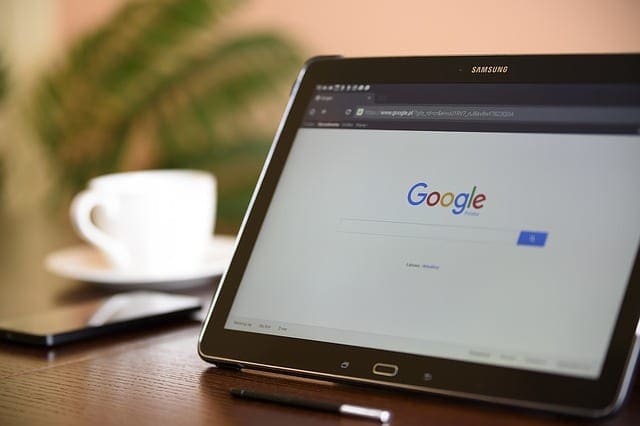These days, we rely on Google for almost every aspect of our lives. I would be hard pushed to believe that there’s even a day goes by where we do not Google something at some point. We use it to see the distance to our next meeting, as a teacher for new skills, to find dinner inspiration, our nearest petrol station, our nearest anything for that matter; the list really could go on and on. But what will happen if Google removes organic search traffic?
In recent times Google has made some rather noteworthy changes that, as users, we probably wouldn’t even notice. But, when it comes to SEO marketing and your business, the changes can seem very scary (if you hadn’t noticed by now, you can never rest on one’s laurels when it comes to SEO marketing). At AIM Internet, we strive to support clients through the ever-changing market and offer solutions to the issues that have arisen thus far, from the Google changes.
So what’s the story? What exactly has Google changed?
In years gone by Google has been consistent in sending more searches and organic traffic than any other search engine. Not once in these years has organic traffic even plateaued, let alone declined. With such month on month, year on year growth Google has become the most popular search engine in the world. From this, they have created a platform for worldwide advertising, audience growth and an increase in traffic.
Fortunately, the reasons for Google’s changes aren’t a result of fewer searches or lack of momentum. Google’s changes are to try and improve user experience and streamline the search engine results page (SERP) in line with our adapting search habits.
However, with that comes an extra layer of complexity when it comes to SEO. By removing some organic search results, businesses now have to rethink their strategies in order to maintain a successful SEO campaign. Something AIM Marketing can help with.
What is the reason for Google’s changes?
As previously mentioned, these changes are in line with our constantly evolving search habits, with the aim of improving and streamlining user experience and search engine results. If you take Adwords as an example, it’s imperative for marketers to understand the importance of quality score. This is because Google will actually withhold the ad as opposed to displaying an underperforming ad, which offers the user a bad experience. It would appear that this methodology is what they’re trying to introduce for organic search results too.
The increase in voice search and mobile traffic in particular, has seen Google implement several new changes. The good news is, that as SEO experts we can help you devise personalised strategies that work to you and your business’ advantage.
What’s the big deal about the changes?
Take “answer boxes” as the first example, if you type a question into Google, it will give you an answer box with everything you need. This means there’s no need to click through any further, you type it in and the answer is the first thing you see. For example, if you type “what is the time in Sydney?” Google will give you the time and date.

If Google doesn’t have a clear answer to your question, it will then provide other results and other related topics and suggestions.
Similar to the above “answer boxes” Google is also moving into the commercial space by providing answers to things such as flights, hotel bookings, products and anything else you may search. Again, this means less opportunity for other businesses. Previously if you wanted to search for a hotel, you would need to click through onto a hotel booking website to get results whereas now, Google can give you everything you want in one single search (not great news for anyone other than Google and the user).
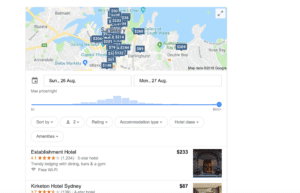
Local search engine results pages (SERPS) are also becoming so streamlined that users no longer need to click through to the actual website. This could be detrimental to the continuing success of small and local businesses. This is why it’s even more important than ever to optimise your website for mobile and make it easy to find on Google search. If a user has to spend a long time looking for your website and if / when they find it it’s difficult to use they won’t stick around.
Google has also been trialling Zero-Results SERPS, which is exactly what it sounds like. Take the previous example, when we search “what is the time in Sydney?” during the trial it would only display the time and date box with no further links unless you clicked “show all results”. This is seriously bad news for other businesses as it’s an extra step for the user before they even see your link IF you’re on the first page of Google SERP.
AIM Marketing Solutions
Although all of Google’s changes will have an impact on business owners and how marketers tackle SEO it’s not all doom and gloom. It’s simply a case of adapting strategies and making the changes work for your business, which is something we are experts at here at AIM. There are plenty of options to keep you in the game. Voice search is just one of many things that’s on the rise in these changing times. Other strategies include following:
- Rank for brands and branded product names – a very successful (future proofing) approach is investing in demand generation as opposed to demand serving. Have a look at the example below:
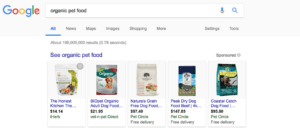
If you type in “organic pet food” it displays a list of organic pet food brands. This is where you need your product or service to show. Therefore it’s important to work with your SEO and marketing team to deliver a strong brand for your business and a strong approach of the brands you sell. If you’re simply optimising for “organic pet food” you may struggle in a big market not to mention, if Google removes organic search results or click through options.
However, if you search for a particular brand of pet food, the chance of ranking is significantly higher. As you can see below, if you search for a specific brand (your brand) you will ideally pop up first.
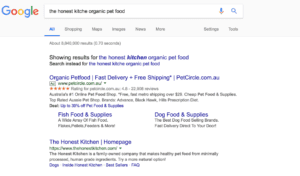
It is very unlikely that Google will remove company brand names, which means if you build demand around your brand, you will ultimately protect your business and remain competitive. This same approach can be adapted and used with content, social media, and many other marketing platforms.
- Optimise for different platforms – speaking of other marketing platforms, it’s important to embrace new platforms when working with your marketing team. Standing still for too long in this industry will leave you struggling to catch up. Currently, Youtube and Google Images make up around one half of the total Google web search. This is a lot of potentially untapped traffic. Youtube in particular, is predicted to account for the majority of web traffic by 2021. This makes it a very worthwhile investment, especially if you use it to build brand / product awareness. Don’t forget about the ones that have been around a while too, Facebook, Instagram, LinkedIn, Pinterest, Twitter, but don’t use them for the sake of having them. Only invest time and money if they add value to your business. Valuable content that is shared can bring traffic directly back to your website therefore bypassing Google search.
- Optimise the results Google is giving you – when it comes to Google answers in the SERP make them work for your business. An experienced marketer – like the guys here at AIM Marketing – will be able to get your content in the answer boxes and increase click through rate. AIM do this by identifying the query your business would like to optimise for followed by identifying the keywords that are most likely to create answer boxes. This is by no means a quick process, but by analysing SERPs you will gain a much deeper understanding to help with the overall strategy. A key point is that you will eventually learn how much information to display, without giving too much away so that the user doesn’t have to click through.
- Use Local to your advantage – it may seem like it’s nothing but bad news for local businesses, but Google My Business can still be a great friend. The information here can be optimised so that when a user types a particular query, they are likely to receive information on your brand / products or services. Even if there is no link to the website, there will still be information about your business. By optimising in this area your business will still appear in the search engine results even if it goes no further.
- Make the most of the results – even if Google removes organic search it is likely that they will keep AdWords. This means the option is there to use remarketed lists for search advertising and time (and money) can be invested in optimising paid ads.
In Summary
Although big changes are coming our way, as marketers this is something we are very used to and very well equipped to deal with. There are still plenty of options when it comes to strategising and optimising your campaigns. Something that has never changed and probably never will, is the importance of creating quality content that is relevant. Content is king and is the key to creating strong brand awareness. It’s also extremely important to analyse and understand the customer journey, by doing so you can enhance the user experience, which will in turn, enhance your business. By analysing your data thoroughly, here at Aim Marketing we can also work with you to generate unique marketing strategies tailored to your business and audience and identify the platforms that will work for you.
It’s not easy keeping up with the fast pace of the digital world, or even Google’s changes for that matter, but it’s imperative now more than ever that as a business, you create strong brand awareness and maintain a strong brand. The key to success is to continuously learn and adapt.
As we enter into an age of change, it’s very likely that Google will continue their focus on enhancing user experience and in doing so, implementing more changes. That’s exactly why it’s the perfect time to analyse your site and make sure you’re ready for whatever’s Google throws at us next.
If you want to know more on how you can make Google’s changes work for your business, or if you’re interested in working with our AIM Marketing SEO experts, give us a call on 0207 856 0418 or send us an email at at info@aiminternet.co.uk.
If you enjoyed reading this article you may also like to read our previous post on the PPC distance report.
